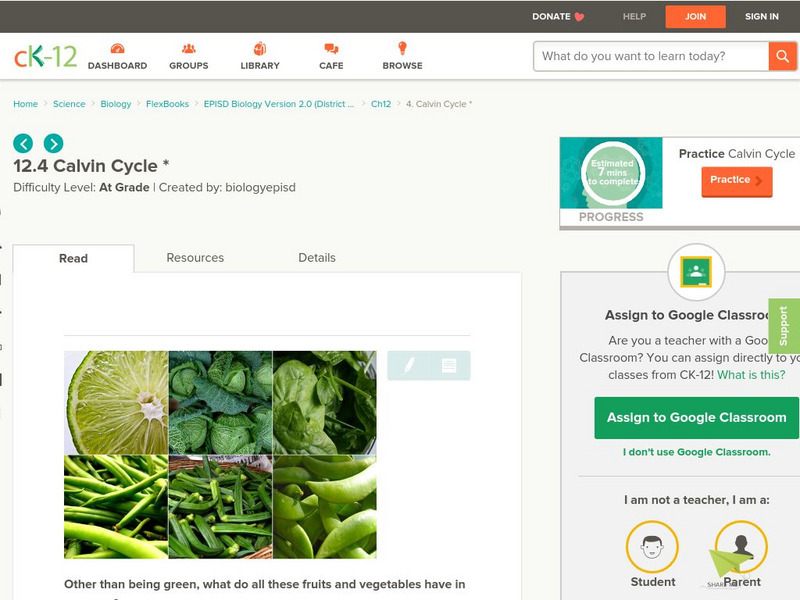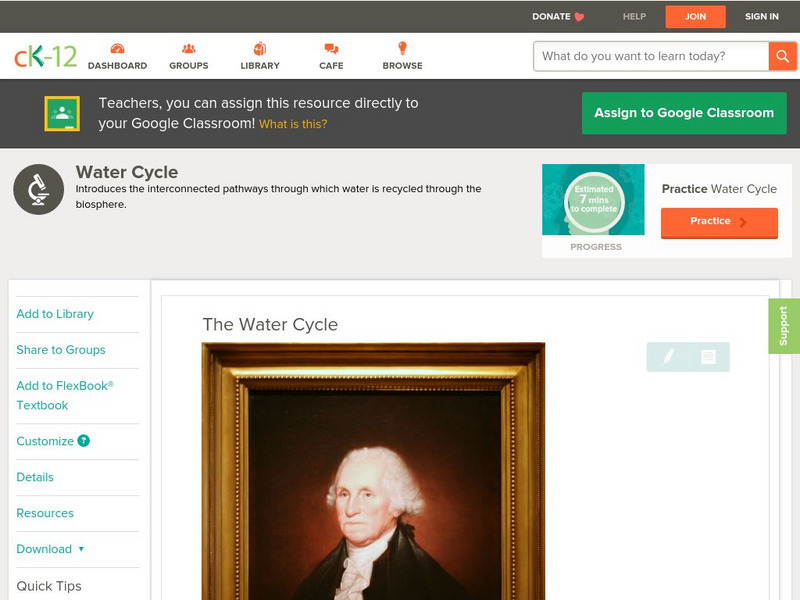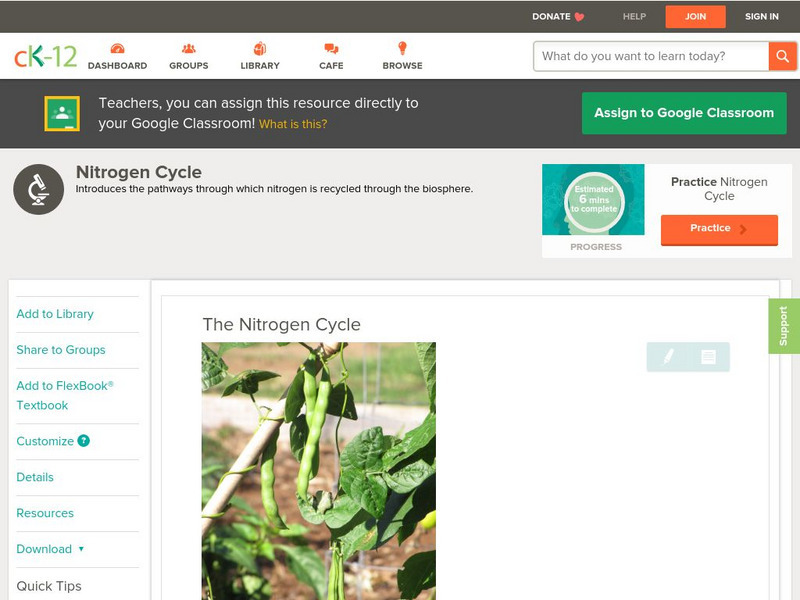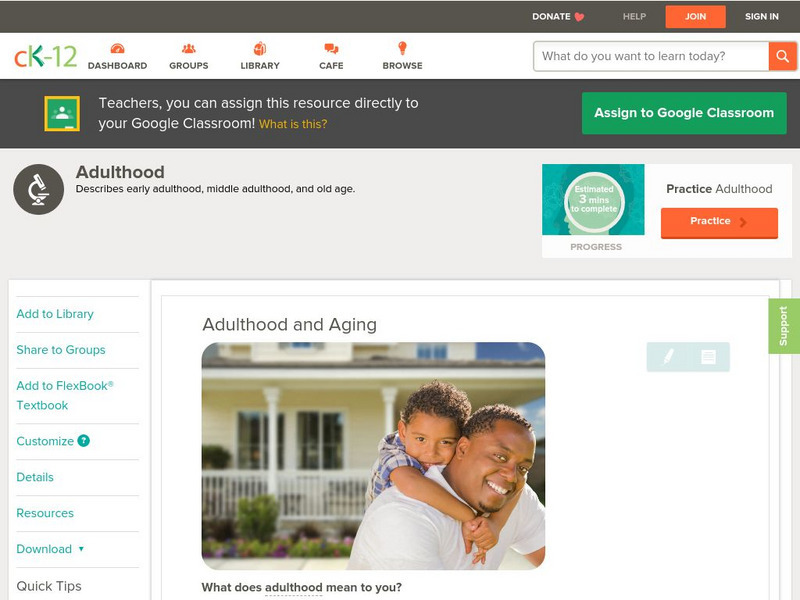Hi, what do you want to do?
Georgia Department of Education
Ga Virtual Learning: Ap Biology: Ecology
Students review the study of living things and make connections back to Earth's systems. This unit focuses on how various species, grouped in populations and communities, work with the nonliving things around them to ensure survival.
Georgia Department of Education
Ga Virtual Learning: Ap Biology: Cell Reproduction
Through informational text, interactive activities, online labs, and video animations, students explore the major concepts of cell reproduction.
Other
Curriki: Butterfly Life Cycle Lesson Plan
Project to learn about the life cycle of a butterfly and how the caterpillar becomes to be a butterfly.
CK-12 Foundation
Ck 12: Calvin Cycle
[Free Registration/Login may be required to access all resource tools.] The second stage of photosynthesis, the Calvin Cycle, is described. Students will learn how to write the overall photosynthesis equation, explain RuBisCo, describe...
Cosmo Learning
Cosmo Learning: Introductory Biology
A collection of video lectures discussing applications of human biology taught at Massachusetts Institute of Technology. Lectures vary in length and cover topics like the cell cycle, stem cells, and cancer.
Georgia Department of Education
Ga Virtual Learning: Biology: Ecology Ii
Through a series of multi-media learning activities, students will assess the dependence of all organisms on one another and the flow of energy and matter within their ecosystems.
CK-12 Foundation
Ck 12: Life Science: Water Cycle
[Free Registration/Login may be required to access all resource tools.] Water and elements like carbon and nitrogen are constantly being recycled through the environment. This process is called a biogeochemical cycle because it involves...
CK-12 Foundation
Ck 12: Life Science: Cell Cycle
[Free Registration/Login may be required to access all resource tools.] The process of cell division in eukaryotic cells is carefully controlled. The cell cycle is the life cycle of a cell, with cell division at the end of the cycle....
CK-12 Foundation
Ck 12: Life Science: Carbon Cycle
[Free Registration/Login may be required to access all resource tools.] Carbon is one of the most common elements found in living organisms. Chains of carbon molecules form the backbones of many molecules, such as carbohydrates,...
CK-12 Foundation
Ck 12: Life Science: Menstrual Cycle
[Free Registration/Login may be required to access all resource tools.] The menstrual cycle is a series of changes in the reproductive system of mature females that repeats every month. Learn more about the menstrual cycle in this...
CK-12 Foundation
Ck 12: Life Science: Nitrogen Cycle
[Free Registration/Login may be required to access all resource tools.] Like water and carbon, nitrogen is also repeatedly recycled through the biosphere. This process is called the nitrogen cycle. Learn more about the nitrogen cycle in...
CK-12 Foundation
Ck 12: Life Science: Insect Reproduction and Life Cycle
[Free Registration/Login may be required to access all resource tools.] Most insects can reproduce quickly within a short period of time, which means they evolve faster and can adjust to environmental changes. Most reproduce by sexual...
Khan Academy
Khan Academy: The Biology of Zika Virus
Learn about the basic biology, origins, life cycle, and symptoms of Zika virus.
BioMan Biology
Bio Man Biology: Photosynthesis Respiration Game!
Learn about the chemistry of photosynthesis and respiration as you play this game.
Georgia Department of Education
Ga Virtual Learning: Biology: Cell Reproduction
Through informational text, interactive simulations, and step-through animations, students discover two major processes of cell reproduction; mitosis and meiosis.
CK-12 Foundation
Ck 12: Virus Replication
[Free Registration/Login may be required to access all resource tools.] How do viruses replicate? In this lesson, students will learn how a virus produces new copies of itself.
Center for Innovation in Engineering and Science Education, Stevens Institute of Technology
Ciese: Carbon Imbalance: Algae to the Rescue? [Pdf]
A 95-page learning module that integrates biology, chemistry, and engineering. It includes in-class labs, virtual labs, and engineering design activities. Working with algae, students learn about and investigate how photosynthesis,...
TeachEngineering
Teach Engineering: Swim to and From the Sea!
Students are introduced to the basic biology behind Pacific salmon migration and the many engineered Columbia River dam structures that aid in their passage through the river's hydroelectric dams. Students apply what they learn about the...
TeachEngineering
Teach Engineering: Waves: The Three Color Mystery
Students are presented with a challenge question concerning color blindness and asked to use engineering principles to design devices to help people who are color blind. Using the legacy cycle as a model, this unit is comprised of five...
CK-12 Foundation
Ck 12: Life Science: Infancy and Childhood
[Free Registration/Login may be required to access all resource tools.] The first year after birth is called infancy. Infancy is a period when the baby grows very fast. During infancy, the baby doubles in length and triples in weight....
CK-12 Foundation
Ck 12: Life Science: Light Reactions of Photosynthesis
[Free Registration/Login may be required to access all resource tools.] Although we generally discuss plants when learning about photosynthesis, keep in mind that plants are not the only organisms that can make their own food. Some...
CK-12 Foundation
Ck 12: Life Science: Process of Cellular Respiration
[Free Registration/Login may be required to access all resource tools.] Why do you need air to live? Of course if you didn't breathe, you couldn't survive. You need the gas oxygen to perform cellular respiration to get energy from your...
CK-12 Foundation
Ck 12: Life Science: Adulthood and Aging
[Free Registration/Login may be required to access all resource tools.] When is a person considered an adult? That depends. Most teens become physically mature by the age of 16 or so. But they are not adults in a legal sense until they...
CK-12 Foundation
Ck 12: Life Science: Fungi Reproduction
[Free Registration/Login may be required to access all resource tools.] Different fungi reproduce in different ways. Many fungi reproduce both sexually and asexually. However, some reproduce only sexually and some only asexually. Asexual...



















![Ciese: Carbon Imbalance: Algae to the Rescue? [Pdf] Unit Plan Ciese: Carbon Imbalance: Algae to the Rescue? [Pdf] Unit Plan](http://lessonplanet.com/content/resources/thumbnails/455842/large/bwluav9tywdpy2symdizmdeyny0xmdcynjyylwcwy3uxni5qcgc.jpg?1674855345)






